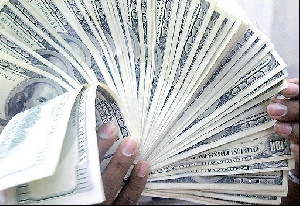The International Monetary Fund (IMF) has welcomed the central bank’s revision of its strict foreign exchange regulations that were introduced in February, telling the Business & Financial Times it expects the relaxation of the measures to boost foreign exchange inflows and reduce transaction costs for businesses.
The IMF was among critics that expressed doubts about the efficacy of the regulations launched by the Bank of Ghana (BoG) to stem a devastating fall in the cedi at the beginning of the year. It went further to recommend a review of the measures in its annual report on Ghana issued last month.
Last week the BoG said it has decided to amend the regulations to take account of the complaints of individuals and firms whose activities were constrained by the measures.
According to Samir Jahjah, IMF Resident Representative, the Fund “welcomes the review of the forex regulations with the objective of mitigating any unintended consequences. It may help reduce transaction costs for SMEs and exporters and increase foreign exchange inflows”.
He added, though, that “it remains important [for the authorities] to continue addressing the root causes of the [economy’s] imbalances”.
A previous rule that holders of foreign exchange accounts cannot withdraw over-the-counter from those accounts in foreign currency has now been relaxed to allow withdrawals of up to US$1,000 per transaction.
Hotels, schools and other service providers previously barred from accepting payments in foreign currency can now do so if the payer is a non-resident. In addition, the requirement that exporters repatriate their earnings within 60 days of shipment, together with the rule that those earnings be converted to cedis within five days, has been reversed.
Exporters will now repatriate their income when it is actually received by them, and they can retain a maximum of 60 percent in foreign currency in their local foreign exchange accounts, while the remaining 40 percent should be converted by their banks to cedis within 15 working days.
Other restrictions were left unchanged, including the prohibition of foreign currency loans to non-foreign currency earners and the ban on use of foreign currency cheques.
The IMF, like most analysts, believes the cedi’s weakness is the product of macroeconomic instability underlined by high fiscal and current account deficits.
While it lauded the government’s efforts to slash the deficits in its recent evaluation of the economy, it also recommended further steps to be taken to cut the deficits quickly and limit the country’s vulnerability to shocks while putting the economy on a sounder financial footing.
There’s a belief among some analysts that it’s time for Ghana to request financial assistance from the Fund to tackle the balance of payments problems which have caused the cedi’s rapid depreciation.
On Tuesday the central bank quoted the currency’s exchange rate at 3.0097 cedis to the dollar, bringing the year-to-date depreciation to more than 26 percent -- which is the fastest slide in 14 years.
Mr. Jahjah said the government is doing a lot on its own to tackle the problems, and has not expressed any intention of seeking a bail-out from the Fund.
But he said additional revenue and spending measures will be necessary to lower the deficit faster, with the benefit of reducing the economy’s high interest rates.
Head of the Financial Stability Department of the Bank of Ghana, Benjamin Amoah -- who read the central bank’s statement on Friday announcing the revision of the foreign exchange measures- said he agrees that the fundamental causes of pressure on the cedi are the large domestic and external deficits.
He therefore repeated the central bank’s advice for government to “adhere strictly” to its fiscal targets in order to rein-in the imbalances.
Business News of Wednesday, 18 June 2014
Source: B&FT

















